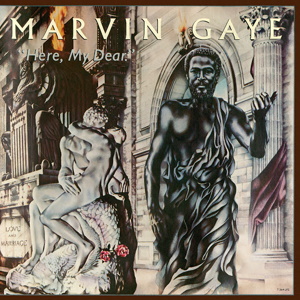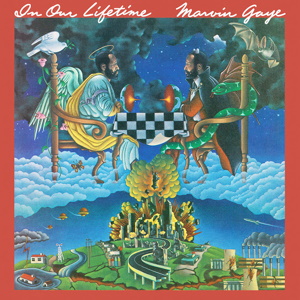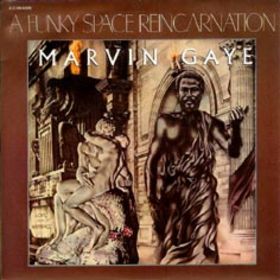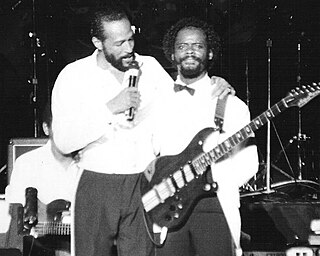
Let's Get It On is the thirteenth studio album by American singer, songwriter, and producer Marvin Gaye. It was released on August 28, 1973, by the Motown Records subsidiary label Tamla.

Here, My Dear is the fifteenth studio album by music artist Marvin Gaye, released December 15, 1978, on Motown-subsidiary label Tamla Records. Recording sessions for the album took place between 1977 and 1978 at Gaye's personal studios, Marvin Gaye Studios in Los Angeles, California. The album was notable for its subject matter's being dedicated to the fallout of Gaye's marriage to his first wife, Anna Gordy Gaye.

"Got to Give It Up" is a song by American music artist Marvin Gaye. Written by the singer and produced by Art Stewart as a response to a request from Gaye's record label that he perform disco music, it was released in March of 1977.

I Want You is the fourteenth studio album by American soul singer and songwriter Marvin Gaye. It was released on March 16, 1976, by the Motown Records-subsidiary label Tamla.
"Just to Keep You Satisfied" is a song by soul singer Marvin Gaye. The song was the b-side to Marvin's modest 1974 hit, "You Sure Love to Ball" and was the eighth and final song issued on the singer's 1973 album, Let's Get It On.

In Our Lifetime? is the sixteenth studio album by soul musician Marvin Gaye, released January 15, 1981, on Motown label Tamla Records. Recording sessions for the album took place at Marvin's Room in Los Angeles, California, Seawest Recording Studio in Honolulu, Hawaii, and at Odyssey Studios in London, England, throughout 1979 and 1980. The album cover was designed by Neil Breeden. Gaye's final album for Motown before leaving for Columbia Records, the album was the follow-up to the commercial failure of Here, My Dear, a double album which chronicled the singer's divorce from Anna Gordy. Entirely written, produced, arranged, and mixed by Gaye, In Our Lifetime? was a departure for Gaye from the disco stylings of his previous two studio efforts and was seen as one of the best albums of the singer's late-Motown period.
"After the Dance" is a slow jam recorded by singer Marvin Gaye and released as the second single off Gaye's hit album I Want You (1976). Though it received modest success, the song was one of Marvin's best ballads and served as part of the template for quiet storm and urban contemporary ballads that came afterwards.

Live at the London Palladium is a live double album by soul musician Marvin Gaye, released March 15, 1977, on Tamla Records. Recording sessions took place live at several concerts at the London Palladium in London, England, in October 1976, with the exception of the hit single "Got to Give It Up", which was recorded at Gaye's Los Angeles studio Marvin's Room on January 31, 1977. Live at the London Palladium features intimate performances by Gaye of many of his career highlights, including early hits for Motown and recent material from his previous three studio albums. As with his previous live album, Marvin Gaye Live!, production of the record was handled entirely by Gaye, except for the studio portion, "Got to Give It Up", which was managed by Art Stewart.
"I Met a Little Girl" is a song recorded by singer Marvin Gaye for his Here, My Dear album. Recorded at his studio in 1976, the song chronicles the growth and demise of Gaye's marriage to his first wife Anna. In a classic doo-wop style, Gaye croons in his falsetto about how he fell for Anna and how their love died out, chronicling the years between their wedding and their impending divorce. At the end of the song, Gaye responds "Hallelujah, I'm free" in a dark and somber tone.
"Anna's Song" is a song recorded by singer Marvin Gaye as part of his 1978 album, Here, My Dear. Recorded during the midst of Marvin and estranged wife Anna going through an acrimonious divorce, the song autobiographically depicted several parts of Marvin and Anna's past including one lyric that hints at his first hit single, "Stubborn Kind of Fellow" where Gaye says "What's it, husband, makes you so stubborn?". A memorable part of the song for Marvin's fans includes a verse where Marvin's vocals rise when singing Anna's name. Unlike most of the songs on the album with the exception of "Sparrow", this song was recorded in a jazzy atmosphere.
"When Did You Stop Loving Me, When Did I Stop Loving You" is a 1978 song recorded by singer Marvin Gaye for his Here, My Dear album, following his 1976 divorce when he was ordered to give half the takings of his next album to ex-wife Anna Gaye. In the album, he "poured his emotions into songs agonisingly documenting their relationship's rise and fall."

"A Funky Space Reincarnation" is a 1978 jazz-funk single recorded and released in 1979 by Marvin Gaye on the Tamla label.
"Anger" is a 1979 single released by singer Marvin Gaye recorded in 1978 for the album, Here, My Dear. The song was issued in 1979 as a single in Canada but failed to chart there. The song discussed mental anguish and pain over bitterness and talks specifically of angry confrontation, in Gaye's case, not only with his wife but with various other friends and family members. Marvin then tells his audience that someday soon he'll try to live his life Christian-like with the lyric Someday soon I'll hope and pray like Jesus/I'll reach that wiser age/hope I will learn I never profit from things I do in rage. The singer then states that when anger reaches its boiling point and then climaxes, he realizes that he's lost in love. Though it doesn't reference his marriage to Anna Gaye, who is the antagonist throughout the majority of this album, the couple in the song dealt with similar issues as faced in his real-life marriage.
"Everybody Needs Love" is a 1977 song recorded by American soul singer Marvin Gaye and issued on the singer's confessional 1978 album, Here, My Dear. Though most of the songs on the album were based on a mostly antagonistic view of Marvin's first wife, Anna Gaye, a few songs like this stood out which discussed how everybody needed love. Co-composed with "Let's Get It On" co-writer Ed Townsend, the song was based on a religious theme and was switched around by Marvin in certain areas including the lyrics And my father/he needs love/that's true, baby/and I need love too hinting at the tempestuous relationship between Marvin and his minister-father Marvin, Sr. The song's musical background was also used to introduce the album on the title track.
"You Can Leave, But It's Going to Cost You" is a funk-styled song recorded by Marvin Gaye and featured on his Here, My Dear album, when released in 1978. The song returns the subject of the album back to the demise of the singer's marriage to Anna Gordy Gaye as in this song he discusses a specific day in which the couple argued while at Anna's sister Gwen's house desperately trying to make amends. Marvin discusses that the couple got so mad to the point that they had sex afterwards with Marvin later stating after all (Anna) was (his) wife. He then discusses parts of the court case and how, he says, Anna and her attorneys were doing their best to cause Marvin monetary damage, almost closing in on the singer's home, and in his opinion, his eldest son Marvin III. Before the song ends, Marvin brings in humorous irony in which he explains Anna talking about him on the witness stand.
"Falling in Love Again" is a 1977 song recorded by singer Marvin Gaye and issued on his 1978 album, Here, My Dear album. The song was another track on the personal album that did not discuss the demise of his first marriage. Instead of Anna Gaye, the song talked of the other woman in Marvin's life. Described in "You Can Leave, but It's Going to Cost You" as "that young girl", she was Janis Hunter, whom Gaye had married. In a solemn but still certain tone, he wanted to be sure that this time his love for Janis will be what he had always wanted. But as irony would have it, by the time of the album's release, Marvin and Janis' relationship was failing. By the end of the album's promotion, Janis had split from the singer after nearly two years as a married couple. They eventually divorced in February 1981. This song was the last song on Here, My Dear with a reprise from the album's "theme song", "When Did You Stop Loving Me, When Did I Stop Loving You", playing soon afterwards putting the album to a close for good.

"Pops, We Love You " is a 1978 single recorded and released by Motown stars Diana Ross, Marvin Gaye, Smokey Robinson and Stevie Wonder, as a tribute to the late Berry "Pops" Gordy, Sr., father of Motown founder Berry Gordy, who had died that year after a long battle with cancer.
Anna Ruby Gaye was an American businesswoman, composer and songwriter. An elder sister of Motown founder Berry Gordy, she became a record executive in the mid-to-late 1950s distributing records released on Checker and Gone Records before forming the Anna label with Billy Davis and sister Gwen. Gordy later became known as a songwriter for several hits including the Originals' "Baby, I'm for Real", and at least two songs on Marvin Gaye's What's Going On album. The first wife of Gaye, their turbulent marriage later served as inspiration for Gaye's album, Here, My Dear.










